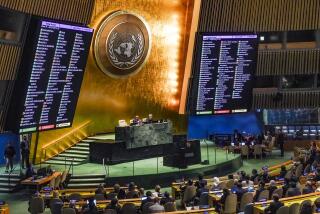U.N. OKs Deployment of Peacekeepers to Macedonia
- Share via
UNITED NATIONS — In a landmark decision, the Security Council voted unanimously Friday to send a battalion of peacekeepers to Macedonia in a gesture aimed at preventing the bloody Yugoslav ethnic conflict from escalating into a Balkans war.
Never before has the United Nations sent peacekeepers to an unscathed area fearful of impending war. It normally sends troops to monitor cease-fire lines or peace pacts after a war has subsided.
But, in a report to the council earlier this week, Secretary General Boutros Boutros-Ghali warned that Macedonia feared being invaded by both Albania and Serbia in a Balkans war. Boutros-Ghali said a deployment of U.N. troops “on the Macedonian side of the borders will help Macedonia and the two neighboring countries concerned to make safe passage through a potentially turbulent and hazardous period.”
The recommendation was in line with a proposal he made last July when he suggested that the deployment of peacekeepers in a fearful country might discourage an invasion by its neighbor. He described this as an element of what he called “preventive diplomacy.”
In the resolution, the United Nations referred to Macedonia as “the former Yugoslav Republic of Macedonia.” Although Macedonia has seceded from Yugoslavia, as have Croatia, Bosnia-Herzegovina and Slovenia, it has not received worldwide recognition because of Greece’s insistence that it change its name. Macedonia is the name of a province in northern Greece. This failure to obtain universal recognition has also prevented Macedonia from gaining admittance to the United Nations.
According to the secretary general, the key security problem of Macedonia--whose president requested the U.N. force--is its border with the Serbian province of Kosovo. Many analysts believe that Serbia, once finished in Bosnia with “ethnic cleansing”--the infamous process of ejecting non-Serbs from Serb-controlled areas--will attempt to repress the largely Albanian population of Kosovo.
If that happens, Albania has vowed to come to Kosovo’s defense. The only roads between Albania and Kosovo lie across Macedonia.
Under the resolution, the U.N. will dispatch a battalion of up to 700 troops, 35 military observers, 26 police and a staff of almost 50 civilians to Macedonia. Boutros-Ghali said this group would have “an essentially preventive mandate of monitoring and reporting any developments in the border areas which could undermine confidence and stability in Macedonia or threaten its territory.”
In another Yugoslav-related development, President-elect Bill Clinton said in Little Rock, Ark., that there are indications that Britain and France may soon drop their opposition to shooting down Serbian warplanes that violate a Security Council resolution banning military aircraft from flying over Bosnia.
When the “no-fly” zone was created in October, no enforcement provisions were enacted because London and Paris feared that combat between U.N.-mandated forces in the air might spread and endanger British and French troops in U.N. forces on the ground.
Times staff writer Norman Kempster in Washington contributed to this report.
More to Read
Sign up for Essential California
The most important California stories and recommendations in your inbox every morning.
You may occasionally receive promotional content from the Los Angeles Times.













